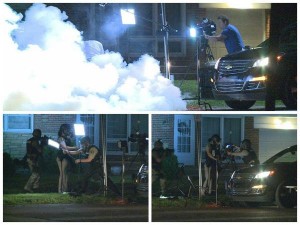Four and a half years after their complicity in killing Aaron Campbell, an unarmed African American in the act of submission during a ‘welfare check,’ it became permissible last month to discipline two involved Portland Police Bureau (PPB) Sergeants.
The actual shooter, Officer Ron Frashour, who removed his earpiece before firing a battlefield-tested, AR-15 assault rife, is not being held accountable. Having failed to make a case of wrongdoing, the City pays him full wages, while not requiring him to report for duty.
Sgt. John Birkinbine was ordered suspended from duty for two weeks.
Birkinbine’s role? A City/Portland Police Association arbitrator ruled this punishment “was not too severe” for luring Campbell to his death.
Birkinbine led PPB’s on-scene communications team. Officer James Quakenbush established rapport with Campbell via text messaging. Birkinbine chose not to relay to the ‘custody’ team (shooters) that Campbell, who was not engaged in criminal activity, had been asked to come out of his home, unarmed. When Campbell complied, cops then escalated violence upon him until the victim sought to evade further injury. Frashour then shot Campbell in the back, for attempting to find ‘hard cover.’
Police communication style is generally one-way: comply or suffer. Despite years of prompting – by consultants, Federal agencies and justice advocates – the City does not want PPB engaged in meaningful dialogue … where authorities will in any way take direction from the consent of the governed.
We also acknowledge The People are using new technology in collaborative, networking styles. We experience unimaginable connectivity.
Cops in Washington State have begun what they call a ‘Tweet Smart‘ campaign.
Nine agencies are asking the public to self-regulate their use of social media during police actions. “Please don’t tweet about the movements of responding police officers, or post pictures,” said Washington State Patrol Chief John R. Batiste. Without elaboration, the press release notes the agencies’ concern began to grow after watching events in Portland, Oregon.
Consult Hardesty advocates that, while the City of Portland has no effective accountability systems to discipline officers, it is imperative that we take responsibility to watch out for our neighbors. We support community-based copwatching; where folks use hand-held devices to document police conduct. We find cogent the real-world hunch, advanced by news photographer Michael Holden: “I think the criminals are probably having more pressing concerns than checking Twitter,” he told the AP newswire.
We concur with online journalist Mónica Guzmán on the matter: “Now that the events in Ferguson are escalating to disturbing levels, with confrontations between police and protesters resembling military engagements, and professional journalists getting arrested for documenting events, isn’t it obvious that the “smart” thing for the public to do in this emergency is to tweet a lot more police activity in real time, not less?”
We’ve seen fictional TV episodes of holed-up bank robbers watching aerial coverage from news helicopters. If this really happened, such detriment need be set beside reliance on social media for a common good. Communities have been informing themselves (including investigators) during fluid conditions like manhunts, reporting, “They went thataway.” When deprived of their rights, under martial law while authorities pursued Boston Marathon bombing suspects, The People remained in a quality of connection that one-to-many mass media communication styles cannot provide.
After Ferguson police employed weapons-grade chemical irritants against them, and then dismantled Al Jazeera America’s image acquisition capacity (see image, right), it’s time to rethink Tweet Smart.
We realize police have been lying with impunity, when it comes to informing us of their conduct. Assessing the time it took to identify Ferguson Officer Darren Wilson as Michael Brown’s killer, we understand cops, when facing accountability questions, are psychologically invested in controlling the flow of information. We can only assume authorities view with some consternation the idea that the public is gathering and disseminating testimony without their consent.
We take the position that it is your patriotic duty to record public servants in their role. If you see a Constitutional violation, report the crime. If you want to design a police accountability mechanism that will bring discipline from such evidence, consult us.
 Until then, follow us on twitter.
Until then, follow us on twitter.



Pingback: BE the Media | Consult Hardesty
Attended this week what were to be ‘hearings’ on Portland Police reforms, to reduce illegal use of force. Instead, City contractors provided a police forum for a police Information Officer to bore us to death with a dog and pony show. Among contentions were cops’ sophisticated use of Twitter.
Many of us have seen ‘be on the lookout notices’ after a crime: “We’re looking for a black male.” I thought to tell ’em, “At least add a qualifier. When you don’t, you’ve put a significant number of people of color in danger. For days afterward, cops will roll up on young black men, saying, “We’ve had a report that someone matching your description was involved in a crime. You don’t mind if I search you, so we can be safe while we have this conversation, do you?””
If cops can’t specify, “He was wearing black pants and a white shirt,” I thought the least they could do was alert folks, “Subject was looking suspicious, and appears to have criminal proclivity.” It sorta goes with cops’ notion of being black.
Pingback: Lured To a Digital Stakeout | Consult Hardesty
See our posts ‘Justice Delivery Tools‘ and ‘BE the Media‘ for more on apps and policing.